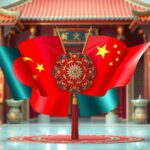Politics
ASIA, BANGKOK, BANGLADESH, BANGLADESH SANGBAD SANGSTHA, BILATERAL COOPERATION, BSS, DHAKA, DIPLOMACY, ECONOMIC COOPERATION, GOVERNMENT, INDIA, INFRASTRUCTURE PROJECTS, INTERNATIONAL RELATIONS, MUHAMMAD YUNUS, NARENDRA MODI, STRATEGIC PARTNERSHIP, THAILAND, TRCMR, XI, XINHUA, YUN, YUNUS
Dante Raeburn
Yunus Calls for Enhanced Chinese Role in Bangladesh’s Stability During Xi Meeting
Bangladesh’s Chief Adviser Muhammad Yunus met with Chinese President Xi Jinping, leading to the signing of nine agreements aimed at enhancing bilateral cooperation. Yunus urged China to play a greater role in establishing regional peace and stability, while Bangladesh secured USD 2.1 billion in investments and loans. The discussions included various strategic issues, infrastructure, and water management projects, signaling a deepening relationship between the two countries.
During a meeting between Chief Adviser Muhammad Yunus of Bangladesh and President Xi Jinping in Beijing, the two countries signed nine agreements aimed at enhancing cooperation in various sectors, including economic and technical collaboration. Yunus emphasized the importance of China’s involvement in fostering peace and stability while noting the significance of recent student protests in Bangladesh that led to political changes.
Bangladesh received commitments amounting to USD 2.1 billion through investments and loans from China. With the signing of these agreements, Bangladesh invites Chinese companies to engage in the Teesta River management and Mongla Port modernization projects. This shift marks a departure from previous government preferences for Indian collaboration on such initiatives.
Yunus urged China to play a more substantial role in ensuring prosperity and stability for both nations. This visit comes as Yunus is set to participate in the BIMSTEC Summit in Bangkok, where he is requesting a meeting with the Indian Prime Minister, Narendra Modi, a conversation whose confirmation is pending.
President Xi acknowledged the longstanding friendly relations between the two countries and reaffirmed China’s commitment to maintaining strong ties. He promised continued zero-tariff arrangements for Bangladeshi goods and expressed interest in negotiating a Free Trade Agreement to facilitate further investments.
During discussions concerning water management, Yunus called for a master plan from China, acknowledging its expertise in handling water issues and recognizing the need for comprehensive management strategies. He lauded the success of China’s flood control methods while highlighting specific bilateral agreements on hydrological cooperation.
Additionally, discussions encompassed a variety of topics, including infrastructure development, renewable energy support, and the Rohingya crisis. Yunus stressed the potential for Bangladesh to emerge as a key transport hub in the region while encouraging Chinese investment. Overall, this meeting signifies an important step in deepening the relationship between Bangladesh and China, setting the groundwork for future economic and strategic collaboration.
In summary, the meeting between Bangladesh Chief Adviser Muhammad Yunus and Chinese President Xi Jinping represents a significant advancement in diplomatic relations between the two nations. Through the signing of various agreements, both countries aim to enhance economic cooperation, particularly in infrastructure and water management. Yunus’s calls for China’s expanded role in regional stability and peace highlight the strategic significance of this partnership. As both nations align their interests, future prospects for collaboration appear promising, setting a new chapter in their longstanding relations.
Original Source: www.ndtv.com








Post Comment